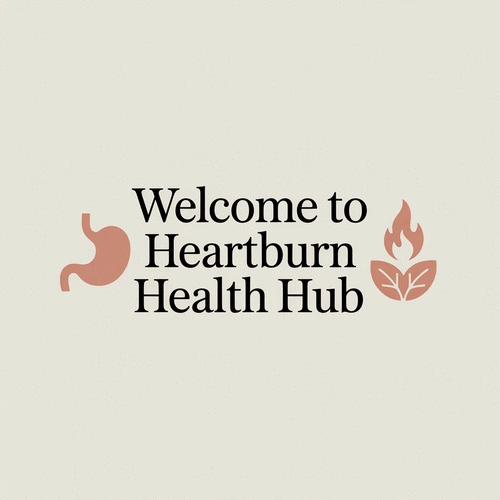Taking control of your heartburn begins with understanding its underlying causes and symptoms. With the right knowledge, you can implement effective strategies to alleviate discomfort and improve your digestive health. Here’s what you’ll discover!
What You Will Learn
- Heartburn is typically caused by stomach acid flowing back into the esophagus, and identifying personal triggers is crucial for management.
- Common symptoms of heartburn include a burning sensation in the chest, sour taste in the mouth, and difficulty swallowing.
- Recognizing the signs of gastroesophageal reflux disease (GERD) is vital, especially if heartburn occurs more than twice a week.
- Gradual lifestyle changes, such as portion control and hydration, can significantly reduce heartburn symptoms.
- Natural remedies, including probiotics and certain exercises, may provide additional relief from heartburn.
- Knowing when to seek medical advice is essential; symptoms like persistent heartburn or difficulty swallowing require professional attention.
Heartburn Insights: Causes, Symptoms, and Management
Understanding the key factors behind heartburn and GERD, from triggers to symptoms and effective management strategies.
Heartburn Fundamentals: What Happens?
Stomach acid flows back into the esophagus when the Lower Esophageal Sphincter (LES) relaxes too much. This is a symptom, not a disease.
- ✓ Overeating or lying down after meals
- ✓ Pregnancy, stress, and certain medications
Key Heartburn Symptoms
Common signs of acid reflux range from chest discomfort to taste changes.
- ● Burning sensation in chest/throat
- ● Sour or bitter taste in mouth
- ● Difficulty swallowing / lump sensation
GERD: When Heartburn Becomes Chronic
Frequent heartburn (2+ times/week) may indicate Gastroesophageal Reflux Disease.
- ● Esophagitis (esophageal inflammation)
- ● Stricture (narrowing of esophagus)
- ● Increased risk of esophageal cancer
Lifestyle Changes for Relief
Gradual adjustments lead to sustainable relief from heartburn symptoms.
- Identify & eliminate 1-2 trigger foods weekly.
- Introduce smaller meal portions.
- Incorporate relaxation techniques.
When to Seek Medical Advice
Don't delay professional help for persistent or severe symptoms.
- ⚠ Persistent heartburn (OTC fails)
- ⚠ Difficulty/painful swallowing
- ⚠ Unexplained weight loss or nausea
Natural Remedies & Movement
Complement lifestyle changes with natural aids and appropriate exercise.
- ● Probiotics (yogurt, kefir, kimchi)
- ● Low-impact exercise (walking, yoga)
- ● Apple cider vinegar (diluted), baking soda (sparingly)
Understanding Heartburn: Causes and Symptoms
Heartburn is a common condition that affects many people, and it can often feel like a fiery discomfort in your chest. When you experience heartburn, it's typically due to stomach acid flowing back into the esophagus, leading to that unpleasant sensation. At Heartburn Health Hub, my goal is to help you understand this condition better so you can manage it effectively!
So, what exactly causes heartburn? There are several factors at play, including diet, lifestyle, and even underlying health issues. Common culprits include spicy foods, caffeine, and high-fat meals. By identifying these triggers, you can take steps to alleviate your symptoms and improve your overall digestive health.
What is Heartburn and How Does it Occur?
Heartburn occurs when acid from the stomach flows back into the esophagus, a process known as reflux. This can happen when the lower esophageal sphincter (LES)—the muscle that keeps stomach acid from rising—reaches too much or too often. It's important to note that heartburn is a symptom, not a disease in itself, but frequent heartburn can be a sign of a more serious condition like Gastroesophageal Reflux Disease (GERD).
- Reflux can occur due to overeating or lying down shortly after meals.
- Pregnancy can also increase the likelihood of experiencing heartburn.
- Stress and certain medications may trigger symptoms as well.
Understanding how heartburn occurs is the first step in managing it. By being aware of your body's signals, you can make informed choices to prevent discomfort.
Common Symptoms of Acid Reflux and Heartburn
The symptoms of heartburn can vary from person to person, but they typically manifest as a burning sensation in the chest or throat. Other common symptoms include:
- A sour or bitter taste in the mouth.
- Difficulty swallowing or a sensation of a lump in the throat.
- Regurgitation of food or sour liquid.
If you notice these symptoms frequently, it’s essential to take action! Keeping track of your experiences can help you identify patterns and triggers. Remember, the more you know, the better you can manage your heartburn!
Gastroesophageal Reflux Disease (GERD): Understanding the Condition
If you find yourself experiencing heartburn more than twice a week, you may be dealing with a more serious condition known as gastroesophageal reflux disease (GERD). GERD is a chronic digestive condition that occurs when stomach acid frequently flows back into the esophagus. This can lead to significant discomfort and complications if left untreated.
- GERD can cause inflammation of the esophagus, known as esophagitis.
- It may lead to a stricture (narrowing) of the esophagus, making swallowing difficult.
- Long-term GERD can increase the risk of esophageal cancer.
Recognizing the signs of GERD early can help you seek the proper treatment and improve your quality of life. If you suspect you might have GERD, don't hesitate to reach out to a healthcare professional for guidance.
Engage with Us!
What strategies have you tried to manage your heartburn? Share your experiences and let us know what worked best for you!
Empowering Yourself Against Heartburn: Next Steps
Taking control of your heartburn means making empowering lifestyle changes that can lead to significant relief. But how do you start this journey? It’s essential to implement changes gradually, allowing your body to adjust while monitoring your symptoms. Here are some practical steps to help you along the way:
- Begin by identifying one or two trigger foods to eliminate from your diet.
- Introduce smaller meal portions to see if it eases your discomfort.
- Incorporate hydration routines by drinking water throughout the day.
By taking these small steps, you can begin to see improvements without feeling overwhelmed. It’s all about progress, not perfection!
How to Implement These Lifestyle Changes Gradually
Gradual changes often prove to be more sustainable. Start with your most significant triggers—whether they’re foods, habits, or stressors. If spicy foods set off your heartburn, consider eliminating them for a week and observing how you feel. Keeping a diary can help track your progress and identify patterns. Here’s a guide on implementing changes:
- Choose one behavior to modify each week.
- Experiment with new recipes that exclude your known triggers.
- Incorporate relaxation techniques, like deep breathing or gentle yoga, a few times a week.
These incremental adjustments can help you adjust without feeling deprived, enhancing your overall well-being.

When to Seek Medical Advice: Recognizing Serious Symptoms
While many heartburn symptoms are manageable, it’s crucial to recognize when to seek medical help. If you experience any of the following symptoms, please consult a healthcare professional:
- Persistent heartburn that doesn’t improve with over-the-counter remedies.
- Difficulty swallowing or painful swallowing.
- Unexplained weight loss or nausea.
- Chest pain that resembles heart-related issues.
Listening to your body is paramount. You deserve to feel comfortable and healthy, and seeking medical advice can help address any underlying issues. Remember, you are not alone on this journey!
Discovering Natural Remedies and Emerging Solutions
As you explore options for managing heartburn, consider natural remedies that may complement your lifestyle changes. Many individuals find relief through a combination of dietary adjustments and holistic approaches. Let’s dive into some of these promising solutions!
Probiotics and Fermented Foods: What the Research Says
Probiotics play a significant role in digestive health. Foods rich in probiotics, like yogurt, kefir, and kimchi, can help balance gut bacteria and may reduce symptoms of heartburn. Research suggests that a healthy gut can lead to improved digestion and less reflux. For more information on how probiotics might help with digestive issues, you can consult resources like this article on probiotics and gastrointestinal diseases. Here are some great options to consider:
- Plain yogurt with live cultures
- Kefir, a fermented milk drink
- Kimchi and sauerkraut for added flavor and health benefits
Incorporating these foods into your diet can be a delicious way to enhance your digestive health and potentially reduce heartburn symptoms!
Specific Exercise Types That May Help Alleviate Symptoms
Exercise can be a powerful ally in managing heartburn. However, it's important to choose the right types of activities. Low-impact exercises, such as walking, cycling, and swimming, can aid digestion without exacerbating symptoms. Here's how to get started:
- Try taking a brisk walk after meals instead of lying down.
- Incorporate gentle yoga stretches that focus on relaxation.
- Aim for at least 30 minutes of moderate exercise most days of the week.
Finding a routine that works for you can help not just with heartburn but also with overall health and well-being. Feeling good in your body is part of taking charge of your health!
Natural Supplements: Exploring Options like Apple Cider Vinegar and Baking Soda
Many people swear by natural supplements for heartburn relief. For instance, apple cider vinegar is often touted for its potential benefits in balancing stomach acidity. When diluted in water, it may help some individuals manage their symptoms. Likewise, baking soda can neutralize stomach acid. However, it’s essential to use these remedies sparingly and consult with a healthcare provider for personalized advice. The National Institute of Diabetes and Digestive and Kidney Diseases provides additional insights on natural remedies for GERD.
- For apple cider vinegar, try a mix of 1-2 tablespoons in a glass of water before meals.
- A quarter teaspoon of baking soda in water can help neutralize acidity when needed.
Always remember to listen to your body and make adjustments as necessary. You know your health best, and these options can provide additional support on your journey to heartburn relief!

Frequently Asked Questions About Heartburn
- What is heartburn?
- Heartburn is a burning sensation in the chest or throat caused by stomach acid flowing back into the esophagus. It is a symptom, not a disease, but frequent occurrences can indicate GERD.
- What are the common causes of heartburn?
- Heartburn is typically caused by the lower esophageal sphincter (LES) relaxing too much, allowing stomach acid to reflux. Triggers include overeating, lying down after meals, spicy foods, caffeine, high-fat meals, pregnancy, stress, and certain medications.
- When should I be concerned about heartburn?
- You should seek medical advice if you experience heartburn more than twice a week (which may indicate GERD), or if you have persistent heartburn that doesn't improve with over-the-counter remedies, difficulty swallowing, unexplained weight loss, nausea, or chest pain resembling heart issues.
- Can lifestyle changes help with heartburn?
- Yes, gradual lifestyle changes such as identifying and eliminating trigger foods, eating smaller meal portions, staying hydrated, and incorporating relaxation techniques can significantly reduce heartburn symptoms.
- Are there natural remedies for heartburn?
- Natural remedies include incorporating probiotics (yogurt, kefir, kimchi), engaging in low-impact exercises (walking, yoga), and trying diluted apple cider vinegar or baking soda sparingly. Always consult a healthcare provider before trying new remedies.
Encouragement to Take Charge of Your Health
At Heartburn Health Hub, we believe that understanding and managing heartburn is a personal journey. It’s time to take charge of your health and make meaningful changes that work for you. Here are some key points to consider as you move forward!
Commit to Lifestyle Changes and Monitor Your Progress
Committing to lifestyle changes requires determination and patience. Remember, it’s essential to track your progress and note what works best for you. Keeping a food diary and symptom log can be invaluable. Celebrate your successes, no matter how small, and adjust your approach as necessary!
Engaging with Your Healthcare Provider for Personalized Support
Don’t hesitate to reach out to your healthcare provider for personalized support. They can provide guidance tailored to your specific needs and help you navigate any challenges that arise. Having a dedicated professional in your corner can make a world of difference!
Finding Community Support Groups for Shared Experiences and Advice
Sometimes, connecting with others who share similar experiences can provide immense comfort and insight. Consider exploring community support groups, whether online or in-person. Sharing stories and advice with fellow heartburn sufferers can offer new perspectives and strategies for your journey.
Recap of Key Points
Here is a quick recap of the important points discussed in the article:
- Heartburn is a common condition caused by stomach acid flowing back into the esophagus.
- Common triggers for heartburn include spicy foods, caffeine, and high-fat meals.
- It is essential to identify personal triggers and keep a food diary to manage symptoms effectively.
- GERD is a more serious condition characterized by frequent heartburn, requiring medical advice.
- Implementing gradual lifestyle changes, such as smaller meals and hydration, can alleviate symptoms.
- Natural remedies like probiotics, gentle exercise, and certain supplements may provide additional relief.
- Seek medical help if experiencing persistent symptoms or significant discomfort.










